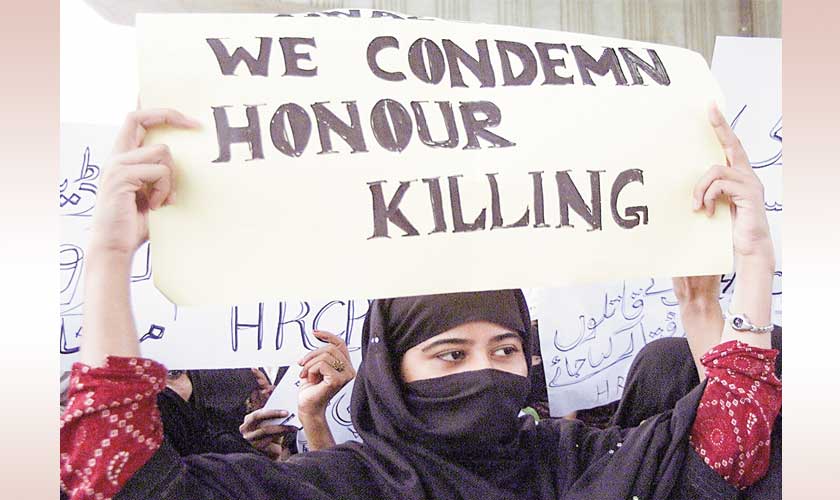A new anti-honour killing bill has been passed recently to award capital punishment for murder in the name of honour. You! takes a look...
A new anti-honour killing bill has been passed recently to award capital punishment for murder in the name of honour. You! takes a look...
In most Muslim countries, including Pakistan, the evil tradition of honour killing still exists where mostly women are executed by their male relatives in the name of honour. Unfortunately, many people still fail to realise that you can’t hide a murder just by giving it the tag of ‘honour killing’.

Recently, two high profile murders (in the months of July and August 2016) in Pakistan once again brought honour killing into focus. And this time round, these murders have seemed to help accelerate the momentum of the anti-honour killing and anti-rape bill in the Parliament.
The law now provides little reprieve to the killer, as now the relatives cannot forgive him/her and grant complete freedom. Under the new law the victim’s relatives can only pardon the murderer if he has been sentenced to death. But this pardon will not give him freedom; instead, he will have to serve a life sentence of twelve-and-a-half years.
The law would have made sense if there was no option of the punishment being converted to life sentence, as this will give culprits a hope that they can get away with murder by just spending a little more than a dozen years in prison. For instance if an 18-year-old commits a murder and gets forgiveness from the victim’s family, he will be out when he is in his prime, at the age of 30. Not a bad deal for him, is it? So, how will justice be served if the criminal gets to leave jail at an age where he can still remarry and build a family and life for himself? Also, is there any guarantee that he won’t kill again in the name of honour?
However, the initial version of the bill had severe weaknesses that gave more space to the killer to go scot-free. An amendment to the law in 2005 allowed the killer a chance to freedom if the relatives of the victim forgave the killer. Since a majority of the murderers in ‘honour killing’ were usually male relatives of the victims, the family usually ended up forgiving the killer. Even though, the final decision was left to the judge’s discretion, we usually saw the criminals going free. This weakness in the law was probably the reason why the killers didn’t seem to fear the law and there have been times when they have ‘surrendered’ themselves to the law.

According to the Human Rights Commission of Pakistan (HRCP) around 1100 women and 88 men became victims of honour killing in 2015. The HRCP report revealed that 987 cases were registered of honour killing in 2015.
987 may not seem like a big number compared to the population. But the reality is that these are only the registered cases, there are probably hundreds of cases that go unregistered and the identity of the victim is lost forever.
The cases that changed it all
A whole new debate started when the murder of the popular internet-star Qandeel Baloch in July 2016 made it into the news. And like her posts in life, her death also became viral.
The other reason her murder was splashed across the media was that at the time of her death she had been in the news for her tussle with a local religious man, as she had posted a controversial video of him with her on her Facebook page.
If Qandeel had been murdered prior her shot to internet fame, the news would have been a few lines tucked away in a small part of the newspaper - if it was reported at all. But since Qandeel had come a long way from being a small village girl, her murder became a sensation and the murderer - her brother - was caught.
The second high profile murder case hit the news a month later - in August 2016 - of Samia Shahid, a British woman who had been killed in her own hometown. Her family had said she died of a heart attack and had hastily buried her. That would have been the end of the matter - the police had no reason to suspect and then Samia’s family was an influential one in the area. No one would dare question the cause of their healthy daughter’s sudden death.
The norms of the society didn’t give the police reason to suspect that there was any foul play. And if it hadn’t been for Samia’s husband - second husband based in UAE - questioning the circumstances surrounding her sudden death, it probably would never have been known that Samia had been murdered.
Samia had remarried after divorcing her first cousin and had moved to UAE from UK. Her family had not been happy with her second marriage and just couldn’t stand their daughter leading a happy life after tarnishing their reputation with divorce.
She was soon to face the consequences of going against the family’s will. Samia decided to visit Pakistan, after she got the news that her father was seriously ill - although she and her second husband were aware that she could be harmed. Here she was killed in her family home by her former husband.
Luckily, these two cases not only got local media attention but also gained prominence in the international media. They may have been the catalyst that caused the amendments in the anti-honour and anti-rape bill to be made and also for the quick passing of this law in September 2016.
Apart from Qandeel’s and Samia’s murders there was a sudden spike in ‘honour killings’ over the summer months. A teenager was burned alive after a local jirga in Abbottabad passed judgement for her alleged involvement in an elopement in May 2016.
In June 2016 many more cases of honour killing were reported. A teenage girl was murdered by her own family - her mother took the blame probably to protect her son - for marrying without the family’s consent in Lahore. Also, a couple in Lahore was murdered by the bride’s father for marrying against his wishes. And then there was a man who killed his sister as she insisted on marrying a man of her choice in Sialkot.
Women are generally the victims of such crimes but men have also been killed in the name of honour. One such victim was 43-year-old Muhammad Irshad who was attacked and killed by his father-in-law and two brothers-in-law in Multan in June 2016.
Honour killing is not restricted to any region or religion; and gender. There have been instances of murder in the name of honour among Muslims, Christians, Sikhs, Hindus etc.
It is high time some steps are taken. The amended punishment to capital punishment and life sentence will act as a deterrent. And maybe this will lead to families not supporting - or at least not openly supporting - the killers and the rate of honour killings will go down.
But the problem is that these sentences can only be given in the cases that are reported - which are only a few. The real problem is the cases that go unreported as they usually are under the radar. Covering up such crimes is way too easy for some people and there is usually no fear of information leaking because the whole family or clan is involved in it.
Women hold little value in a patriarchal society, where the male’s opinion is supreme and word is law. Therefore, it is necessary to bring about a change in the way people think supported by a strong law with extremely strict consequences.